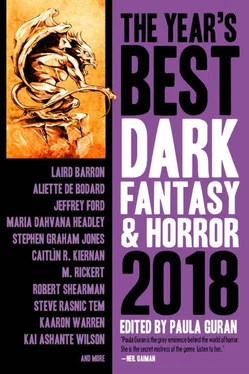“I get hungry at night.”
“You should be eating downstairs. With a fork and knife. At a table.” She crinkled her nose at the lukewarm tilapia, covered it again. “I’ll tell Majid not to let you upstairs with food anymore.”
She left, and Harry closed the door tightly this time. Even cold, the roti smelled of garlic and mustard oil—he had to stop himself from reaching out. He was hungry now, but the beast would be much hungrier before the night was over.
He turned the light out and lay on top of his sheets. He listened until Majid finished in the kitchen, Uncle Amir said goodbye, and Father had come upstairs and eased the bedroom door shut behind himself and the house was entirely silent, entirely still.
Harry packed the food into his schoolbag, slung it over his shoulder, and made his way downstairs. He knew just which floorboards would groan under his weight, just which stairs would squeal in the early morning’s dusty quiet. He never left through the front door—the clunk of the deadbolt as it slid open would wake Mother from her shallow sleep—so he padded down the hall, to the kitchen. Majid was long gone by now, back in his home with wife at the far end of town. The kitchen had a door that opened onto the backyard so Majid could take garbage out unseen by Harry’s parents. Harry gently opened this door, left it unlocked, and slipped into the warm night.
The waxing moon split the world into pale grays and slanting darkness. No light came from the queer, square houses of the compound, but even in the dark Harry knew his way across the lawns and to the break in the wooden fence that separated British families from the town itself.
The beast lurched as soon as he stepped onto the street and the fence hid the compound from view. Harry expected this, though. He feared, sometimes, that the beast knew his mind as well as his body; he stayed up some nights imaging that if it pressed its long tongue to curve of his brain it could taste his intentions in the sparking of his synapses.
The beast settled, pressing its weight into his bowels, and Harry walked on.
Provenance was a long city, a strand of streets and homes clinging to the hem of the Demerara’s silty waters. He walked to the river’s edge, turning off of the paved roads and onto smaller, muddy paths, and continued west. The city changed the further out he went. The British Officers’ groomed, orderly houses gave way to smaller homes: squat, wooden constructions, balanced on stilts, that overlooked the swollen river and the jungle beyond.
He finally had to stop just before he reached the docks. He could stand a little pain from the beast: a clip of its teeth, a prick of its fingers. But it grew more incensed the further out he went, sinking its fingertips into the knobs of his spine and drawing its teeth over the tendons holding his kneecaps to their muscles. He fell heavily onto his hands and knees, his breathing labored.
He slid the backpack off and took out the tilapia and roti. He ripped off a chunk of the roti and crammed it into his mouth, barely chewing before choking it down and readying another fistful. He felt the beast heave upward out of his stomach and reach its greedy jaws to the base of his esophagus. It downed the food heartily, thoughtlessly. Harry ate and ate until there was only a thin layer of roti remaining and the beast had settled back into his intestines, gorged for a time.
He came to a narrow pier at the end of the street. It rocked gently with the current, the water sloshing beneath. A girl, Alice, stood at the far end. She raised a hand to wave; Harry smiled and waved back.
“Wasn’t sure you’d make it,” she said when he got to the pier’s end. She sat back down, dangling her bare feet over the edge.
“Every Friday.” He took a seat beside her and scrounged a lighter out of his backpack. “Wouldn’t miss it.”
Alice slipped two loose cigarettes out of her jeans pocket. She was an Arawak, one of the people who lived in the jungles before the blacks and coolies were brought by the British, and before the British, too. She lived on the other side of the river with her brothers, who fished the Demerara by night.
She put a cigarette between her lips, and Harry fumbled with his lighter, rubbing his thumb raw against the wheel.
He didn’t care much for girls at school—another failing in the eyes of his cricket-obsessed classmates—but Alice was different. He wasn’t sure that what he felt for her was sexual: she was older than him, and boyish, too, with her close-cropped hair, square face, and jeans. She smoked with a practiced, world-weary ease, and when he first told her that he’d never even lit a cigarette before she did not laugh or condescend; she simply showed him how.
Harry finally got a steady flame from the lighter and he lit the cig, breathing in deeply. He let the smoke settle in his chest for as long he could stand. The beast was quiet while the tobacco lingered in his throat and pricked his gums; for the time it took for the cigarette to burn itself low, Harry could try to forget that his body was not his own.
“My father’s taking me to the mill tomorrow,” Harry said after a while. “He wants me to be ready to work with him when I’m done school.”
“Is that what you want to do?” she asked.
“I haven’t really thought about it.”
Swarms of gnats hung low over the river, rising and falling as if touched by the breath of an unseen giant. A fish broke from the water, leaping high in a flash of silver, its sinuous body curved with the effort of flight. When it fell it hit the river with a crack like a gunshot.
“It’s not such a raw deal,” Alice said, tilting her head to look at him. “You’ll have all the money you’d need, and a job lined up. Better than fishing this river for money. Better than cutting cane.”
“You know,” Harry said, regretting he’d brought up the mill at all, “I’ve never been on the other side of the river. At least not since my mother died. It’s so long ago, I don’t remember.”
Alice laughed her dry laugh. A cloud covered the moon, and for a moment the only light came from the reddened ends of their cigarettes.
“I’m not sure you’d like it. It’s not like Provenance. No shops, no bakeries, no buses to take you to school.”
She pulled her feet out of the water and positioned herself closer to Harry, her elbow on the pier and the back of her head cupped in her hand. She looked up at him, and smoke drifted lazily from between her lips. Her eyes flickered upward, made contact with his. The urge to lean down and touch her—to just kiss her—overtook him suddenly, and he slid his hand along the pier’s pulpy wood, closer to hers.
The thought must have occurred to the beast, too, for it rumbled awake out of its nicotine-coated sleep. Its fingers pried clumsily at the bottom of his esophagus; its tongue slithered up, soft and wet.
Harry let it rise in his throat. He felt a warmth spread through his chest, a confidence he’d never before possessed; he felt he could lean down now and kiss her on the lips and it wouldn’t change their friendship, wouldn’t change that at all, it would only—
A motor rumbled downriver. Alice sat up, pulling herself away, and the dream collapsed. The beast slithered back, dragging any confidence Harry might have felt down with it. Alice took a last, long pull, then stubbed out the cigarette on the pier.
“Sounds like my brothers are almost back. You’d better get going.”
“Yeah,” Harry said, giving a small, false smile. He felt the heat of his face going red; he couldn’t let her see the shame that filled hollow where the beast had been. “Time to get home, anyway. Thanks for the smoke.”
He put his lighter back in the bag, waved goodbye, and started back down the pier.
Читать дальше












